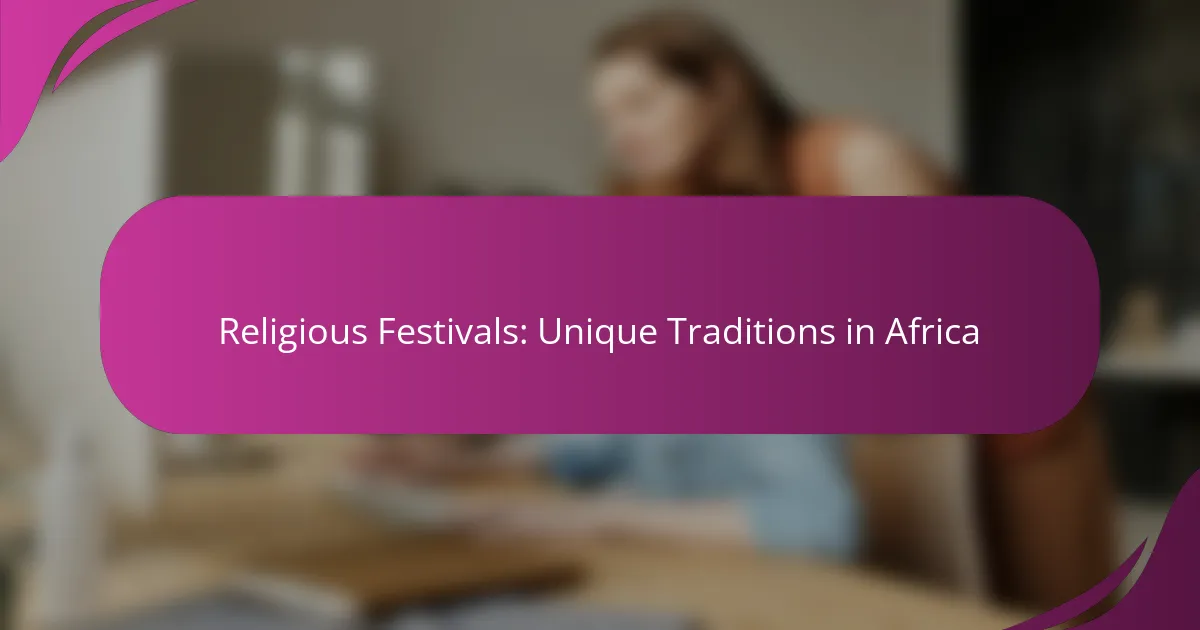Africa is home to a rich tapestry of unique religious festivals that reflect the continent’s diverse cultures and traditions. These vibrant celebrations blend spiritual practices with local customs, music, and cuisine, showcasing the cultural identities of various communities and fostering strong community bonds.
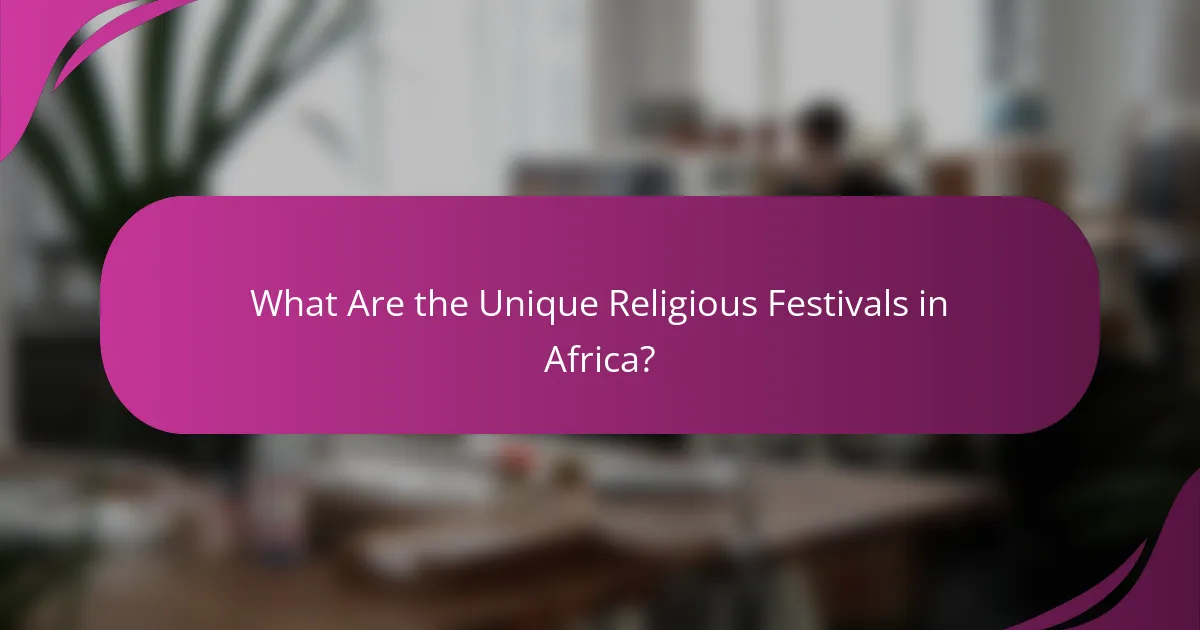
What Are the Unique Religious Festivals in Africa?
Africa is home to a rich tapestry of unique religious festivals that reflect the continent’s diverse cultures and traditions. These festivals often blend spiritual practices with vibrant celebrations, showcasing local customs, music, and cuisine.
Timkat (Ethiopia)
Timkat is the Ethiopian Orthodox celebration of Epiphany, commemorating the baptism of Jesus in the Jordan River. This festival typically occurs in January and lasts for three days, featuring colorful processions, prayers, and the reenactment of the baptism.
Participants dress in traditional white garments, and the Tabots (replicas of the Ark of the Covenant) are paraded through the streets. The event culminates in a large gathering at a body of water where the priests bless the water, symbolizing purification and renewal.
Ouidah Voodoo Festival (Benin)
The Ouidah Voodoo Festival, held annually in January, celebrates the rich heritage of Voodoo culture in Benin. This vibrant festival attracts thousands of visitors who come to witness rituals, music, and dance dedicated to the Voodoo deities.
During the festival, participants engage in various ceremonies, including animal sacrifices and offerings to the spirits. The event serves as a significant cultural gathering that promotes unity and preserves the traditions of Voodoo practitioners.
Maulid an-Nabi (Tanzania)
Maulid an-Nabi is the celebration of the birth of the Prophet Muhammad, observed by Muslims across Tanzania, particularly on the island of Zanzibar. This festival occurs in the third month of the Islamic lunar calendar and features prayers, recitations of poetry, and communal feasts.
During the festivities, participants often dress in traditional attire and engage in cultural performances that highlight the importance of the Prophet’s teachings. The event fosters a sense of community and spiritual reflection among attendees.
Durbar Festival (Nigeria)
The Durbar Festival is a grand celebration held in various northern Nigerian cities, particularly during Eid al-Fitr and Eid al-Adha. This festival showcases a spectacular parade of horsemen dressed in elaborate traditional attire, celebrating Islamic culture and heritage.
Each emirate holds its own Durbar, featuring music, dance, and displays of horsemanship. The event attracts large crowds and serves as a platform for showcasing local craftsmanship and hospitality.
Fes Festival of World Sacred Music (Morocco)
The Fes Festival of World Sacred Music is an annual event that celebrates spiritual music from various cultures around the globe. Held in the historic city of Fes, Morocco, this festival typically takes place in June and features performances by artists from diverse religious backgrounds.
The festival aims to promote peace and understanding through music, with concerts held in stunning venues throughout the city. Attendees can experience a blend of traditional and contemporary sacred music, fostering a dialogue between different cultures and faiths.
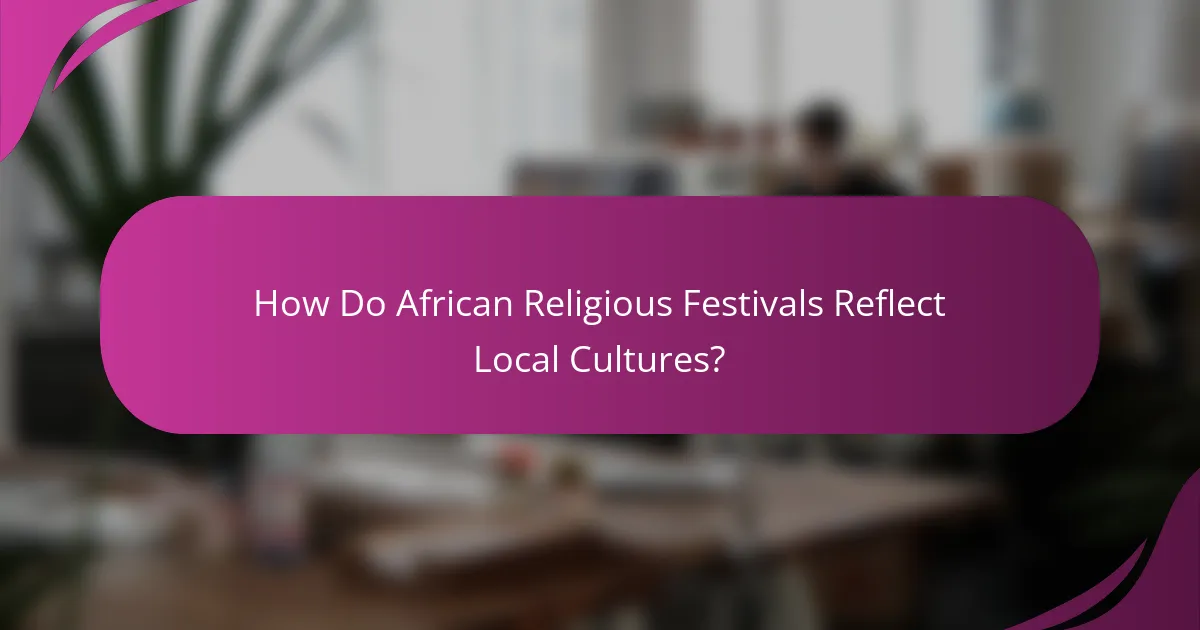
How Do African Religious Festivals Reflect Local Cultures?
African religious festivals are vibrant celebrations that embody the unique cultural identities of various communities. They showcase local traditions, beliefs, and values, serving as a platform for expressing cultural heritage and fostering community bonds.
Integration of Traditional Beliefs
Many African religious festivals are deeply rooted in traditional beliefs, often blending indigenous practices with major religions like Christianity and Islam. For example, the Yoruba festival of Osun-Osogbo honors the river goddess Osun and incorporates rituals that reflect ancestral worship and nature reverence.
This integration highlights the importance of spirituality in daily life, as communities engage in ceremonies that reaffirm their cultural narratives and moral values. Festivals often include offerings, prayers, and rituals that connect participants to their ancestors and the spiritual world.
Community Participation and Unity
Community participation is a cornerstone of African religious festivals, fostering unity among individuals. These events typically involve the entire community, with roles assigned to various members, from organizing to performing. This collective effort strengthens social ties and reinforces a sense of belonging.
For instance, during the Durbar festival in Nigeria, local leaders and citizens come together to celebrate with parades and horse displays, showcasing their cultural pride. Such participation not only enhances community cohesion but also encourages intergenerational bonding as traditions are passed down.
Artistic Expressions and Performances
Artistic expressions play a vital role in African religious festivals, with music, dance, and visual arts serving as key components. Each festival features unique performances that reflect local history and cultural narratives, often involving elaborate costumes and traditional instruments.
For example, the Gerewol festival of the Wodaabe people showcases beauty contests and traditional dances, emphasizing the community’s values of aesthetics and social interaction. These artistic elements not only entertain but also educate participants and spectators about their cultural heritage, making festivals a rich tapestry of expression.
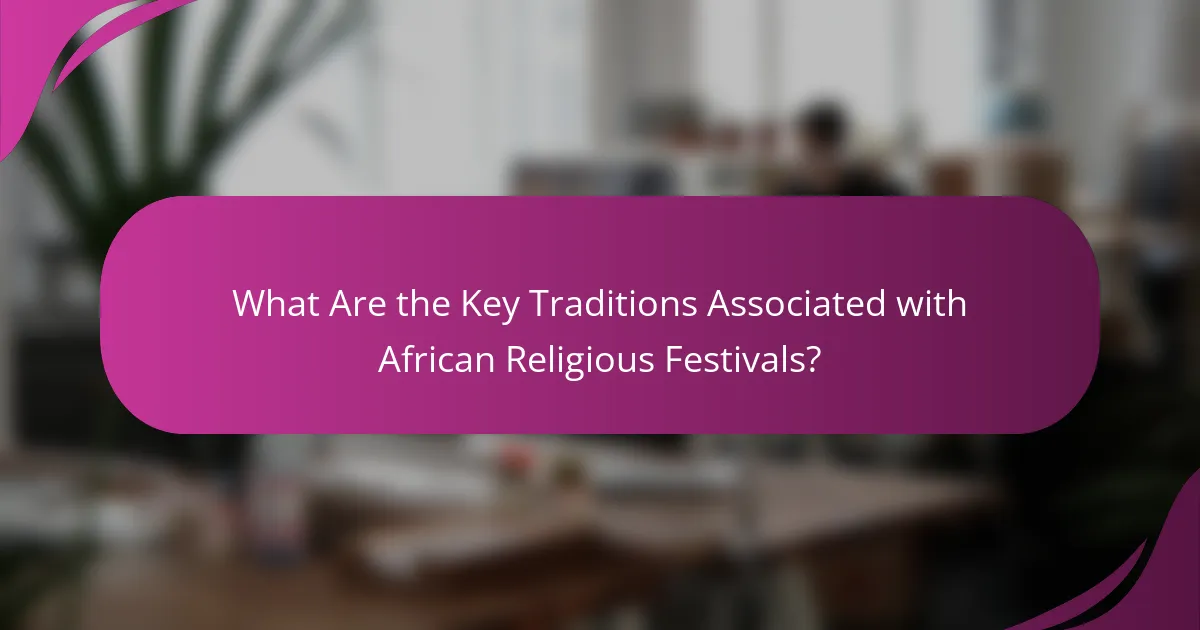
What Are the Key Traditions Associated with African Religious Festivals?
African religious festivals are rich in traditions that reflect the diverse cultures and beliefs across the continent. Key traditions include rituals and ceremonies, music and dance, and food and feasting, each playing a vital role in the celebration and community bonding.
Rituals and Ceremonies
Rituals and ceremonies are central to African religious festivals, often involving prayers, offerings, and symbolic acts that honor deities or ancestors. These practices can vary significantly between different ethnic groups, with some communities performing elaborate rites that may last several days.
For example, during the Zulu Reed Dance in South Africa, young women participate in a ceremony that celebrates purity and womanhood, while honoring the ancestors. Such rituals not only reinforce cultural identity but also strengthen communal ties.
Music and Dance
Music and dance are integral to African religious festivals, serving as expressions of joy, spirituality, and cultural heritage. Traditional instruments like drums, flutes, and stringed instruments accompany vibrant dance performances that often tell stories or convey messages of faith.
During the annual Timkat festival in Ethiopia, for instance, participants engage in lively dances and sing hymns to celebrate the Epiphany, showcasing the deep connection between music, movement, and spirituality in African cultures.
Food and Feasting
Food and feasting are essential components of African religious festivals, symbolizing abundance and community. Traditional dishes often reflect local ingredients and cooking methods, with meals shared among family and friends to foster unity and gratitude.
For example, during the Eid al-Fitr celebrations in many African countries, families prepare special dishes like biryani and sweet pastries, emphasizing the importance of sharing and generosity in religious observances. Such feasts not only nourish the body but also strengthen social bonds within the community.
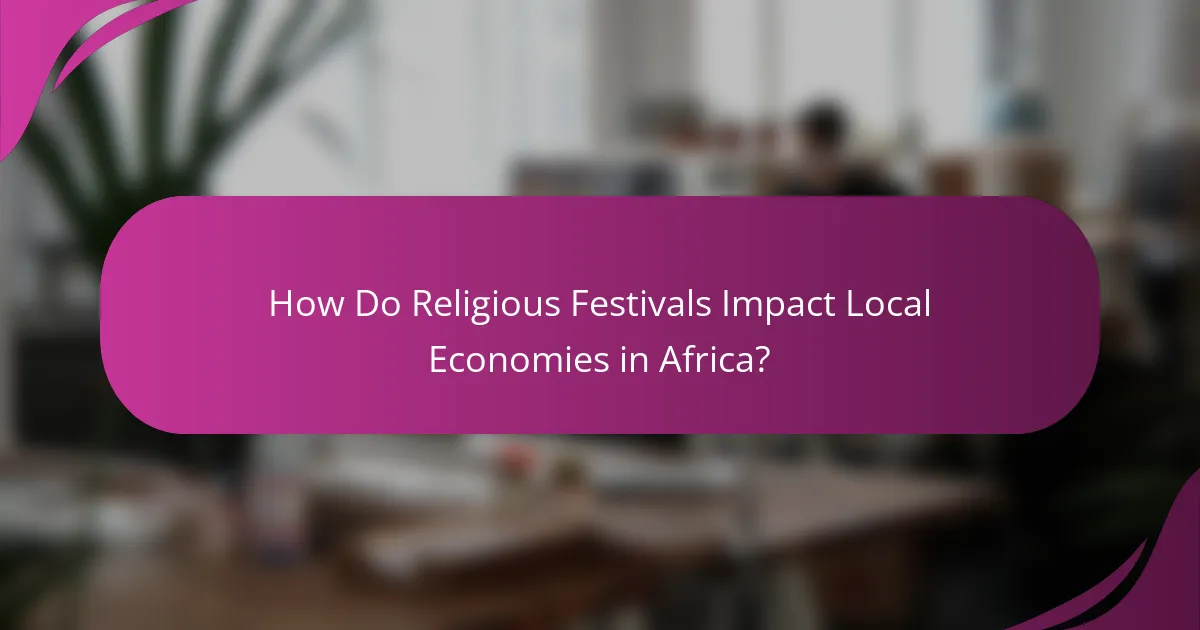
How Do Religious Festivals Impact Local Economies in Africa?
Religious festivals significantly boost local economies in Africa by enhancing tourism, creating business opportunities, and generating jobs. These events draw visitors, stimulate spending, and foster community engagement, leading to overall economic growth.
Tourism Revenue Generation
Religious festivals attract both local and international tourists, which can lead to substantial tourism revenue. Visitors often spend on accommodations, food, and souvenirs, contributing to the local economy. For example, festivals like the Timkat in Ethiopia or the Mawlid in Morocco can see thousands of attendees, generating millions in revenue.
To maximize tourism benefits, local governments and organizations should promote these events through marketing and partnerships with travel agencies. Offering guided tours and cultural experiences can enhance visitor engagement and spending.
Local Business Opportunities
Local businesses, including restaurants, artisans, and vendors, often experience a surge in demand during religious festivals. This increased foot traffic can lead to higher sales and new customer relationships. For instance, craft markets set up during festivals provide artisans with a platform to showcase and sell their products.
To capitalize on these opportunities, businesses should prepare in advance by stocking up on inventory and offering festival-specific promotions. Collaborating with event organizers can also help businesses gain visibility and attract more customers.
Job Creation in Event Management
Religious festivals create a variety of job opportunities in event management, from planning and logistics to security and hospitality services. Temporary positions are often available, providing income for many community members during festival seasons. This can be particularly beneficial in regions with high unemployment rates.
To effectively manage these events, local authorities and organizers should consider hiring from within the community to foster local talent and ensure that the workforce is familiar with cultural nuances. Training programs can also be implemented to equip individuals with the necessary skills for event management roles.
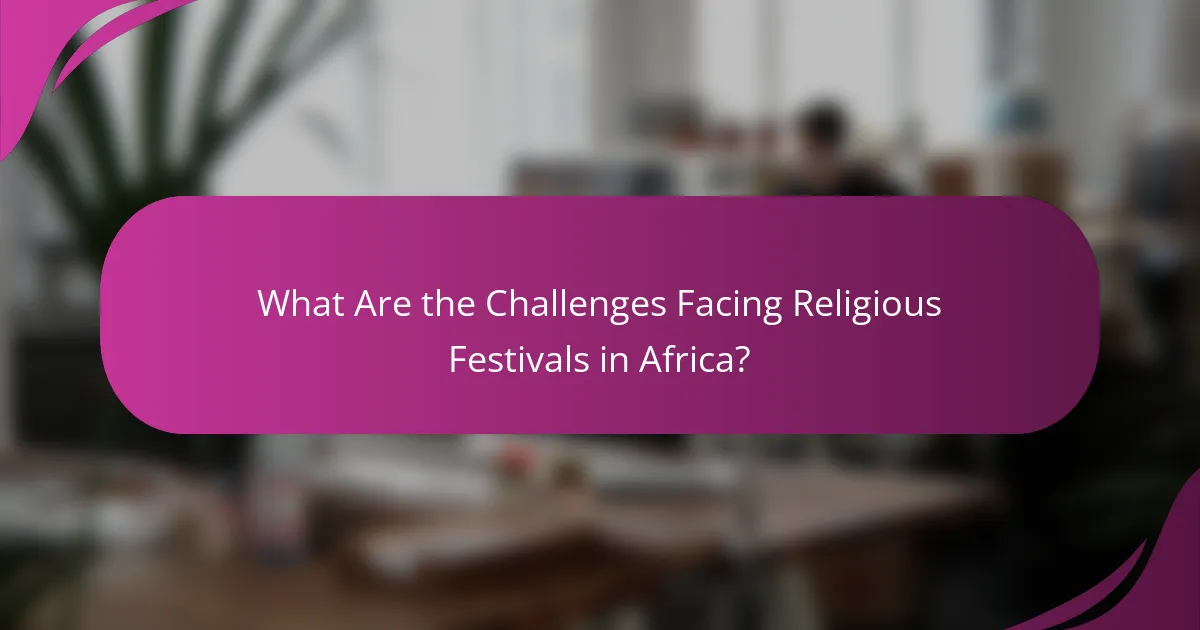
What Are the Challenges Facing Religious Festivals in Africa?
Religious festivals in Africa face several significant challenges that can affect their organization and participation. Key issues include climate change, which alters weather patterns, and political instability, which can disrupt planning and attendance.
Climate Change Effects
Climate change impacts religious festivals in Africa by causing unpredictable weather, such as droughts or heavy rains, which can deter attendance and disrupt events. For instance, festivals that rely on outdoor gatherings may be particularly vulnerable to sudden storms or extreme heat.
Additionally, changing climate conditions can affect agricultural cycles, which are often tied to festivals celebrating harvests. Communities may find it challenging to gather traditional foods or materials needed for rituals, impacting the authenticity and experience of the celebrations.
Political Instability
Political instability poses a serious challenge to the organization of religious festivals in Africa, as conflicts can lead to safety concerns and restricted movement. In regions experiencing unrest, potential attendees may feel unsafe traveling to events, leading to decreased participation.
Moreover, government regulations or restrictions during times of political turmoil can hinder the planning and execution of these festivals. Organizers may face bureaucratic hurdles or may need to adapt to sudden changes in policy, which can complicate logistics and funding.
